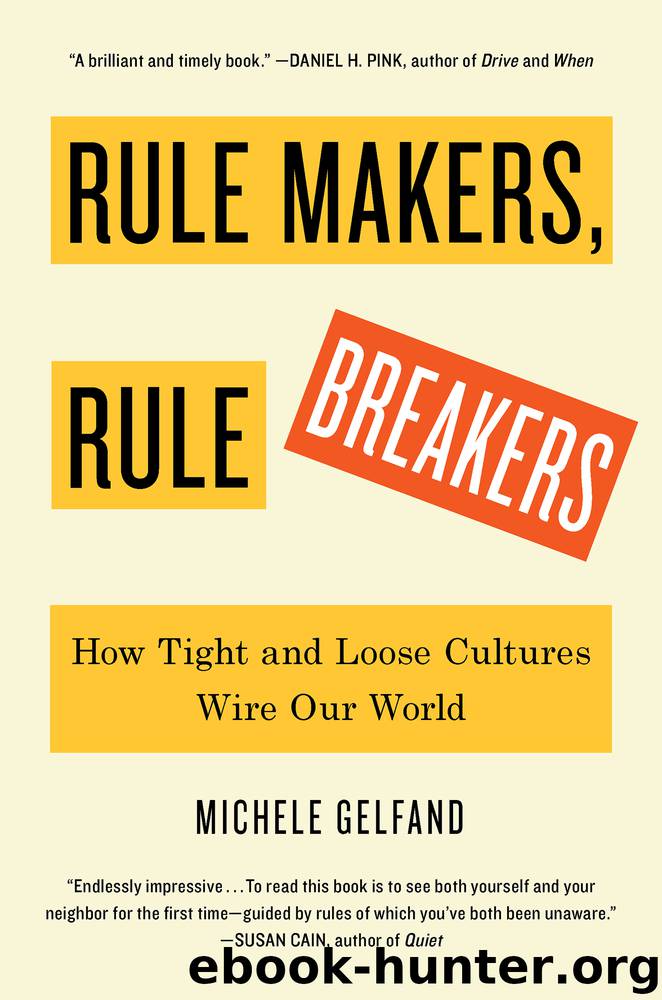Rule Makers, Rule Breakers by Michele Gelfand

Author:Michele Gelfand
Language: eng
Format: epub, mobi
Publisher: Scribner
10
* * *
Culture’s Revenge and Global (Dis)Order
In January 2011, the world watched, stunned, as hundreds of thousands of Egyptian citizens ignited a nationwide revolution. Spanning all age groups, political backgrounds, and religious affiliations, the protesters assembled in Cairo’s major town square to demand the ousting of President Hosni Mubarak and the dismantling of thirty years of autocratic rule. Their rallying chants included “Illegitimate!” and “Mubarak, go!” They used social media platforms to turn up the noise, globally broadcasting their uprising. “We use Facebook to schedule the protests, Twitter to coordinate, and YouTube to tell the world,” explained one protester—in a tweet, no less. Despite several violent clashes between police and demonstrators, hundreds of deaths, and thousands of injuries, the activists didn’t give up. After eighteen days of protests, Mubarak’s authoritarian regime collapsed. The Egyptians’ dream of a new government was finally being realized.
This dream, however, soon turned into a nightmare. Egypt’s first democratically elected leader, Mohamed Morsi, went rogue, granting his office dictatorial powers. By June 2014, he’d been ousted in a military coup, and Abdel Fattah el-Sisi—another oppressive autocrat—had taken the reins. In 2017, human rights groups estimated that there might be as many as sixty thousand political prisoners in Egypt’s jails, a tenfold increase from Mubarak’s rule. New laws repressed protests, and Sisi issued decrees that granted him absolute power to silence his critics.
At first glance, Egypt’s U-turn toward dictatorship seems inexplicable. How did people who joined together with such hope and determination to overthrow a fiercely authoritarian president end up living under an even more autocratic leader?
Many recent societal disruptions around the world—from the Arab Spring to ISIS to the populist wave in politics—have stemmed in part from the structural stress of tight-loose tension. While all of these upheavals have unique elements, each demonstrates a simple truth: Humans crave social order. When people experience disorder and normlessness—when they become exceedingly loose—they desperately yearn for security. Autocratic leaders are there to pick up the cultural pieces and sate this universal need.
Call it culture’s revenge, but tightness-looseness is a stubborn fact of our existence. As long as humans populate the Earth, the strength of social norms will be a key part of our cultural DNA. Part of this cultural code dictates that in response to extreme looseness, humans gravitate toward tightness, and vice versa. Understanding this link between tight-loose dynamics and geopolitical events will allow us to not only better anticipate global trends, but also develop culturally intelligent policies to manage them.
Download
Rule Makers, Rule Breakers by Michele Gelfand.mobi
This site does not store any files on its server. We only index and link to content provided by other sites. Please contact the content providers to delete copyright contents if any and email us, we'll remove relevant links or contents immediately.
| Anthropology | Archaeology |
| Philosophy | Politics & Government |
| Social Sciences | Sociology |
| Women's Studies |
Born to Run: by Christopher McDougall(7127)
The Leavers by Lisa Ko(6948)
iGen by Jean M. Twenge(5416)
Sapiens by Yuval Noah Harari(5372)
Spare by Prince Harry The Duke of Sussex(5197)
The Kite Runner by Khaled Hosseini(5180)
Machine Learning at Scale with H2O by Gregory Keys | David Whiting(4313)
Bullshit Jobs by David Graeber(4192)
Never by Ken Follett(3957)
Goodbye Paradise(3810)
Livewired by David Eagleman(3775)
Fairy Tale by Stephen King(3399)
A Dictionary of Sociology by Unknown(3085)
Harry Potter 4 - Harry Potter and The Goblet of Fire by J.K.Rowling(3074)
The Social Psychology of Inequality by Unknown(3031)
The Club by A.L. Brooks(2926)
Will by Will Smith(2920)
0041152001443424520 .pdf by Unknown(2846)
People of the Earth: An Introduction to World Prehistory by Dr. Brian Fagan & Nadia Durrani(2739)
